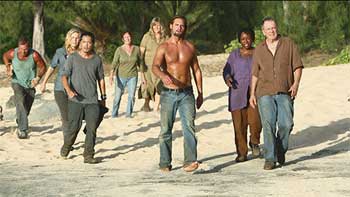 This Wednesday night, Jews worldwide will sit down for the Passover seder, an organized meal with a set order of rituals and readings, which are compiled in the Haggadah. At our seders (Jews outside of Israel generally have two), I know we’ll talk about Passover, what we’re up to in our respective lives, and all the family stuff. But we also share a devotion to watching “Lost.” As observant Jews, we won’t watch TV during holidays and the Sabbath, so we’ll DVR and watch it Saturday night. But that doesn’t mean we won’t think about what we’re missing, and knowing us, we’ll see more than one similarity between the holiday and our ritual TV watching.
This Wednesday night, Jews worldwide will sit down for the Passover seder, an organized meal with a set order of rituals and readings, which are compiled in the Haggadah. At our seders (Jews outside of Israel generally have two), I know we’ll talk about Passover, what we’re up to in our respective lives, and all the family stuff. But we also share a devotion to watching “Lost.” As observant Jews, we won’t watch TV during holidays and the Sabbath, so we’ll DVR and watch it Saturday night. But that doesn’t mean we won’t think about what we’re missing, and knowing us, we’ll see more than one similarity between the holiday and our ritual TV watching.
1. Passover is a widely-celebrated ancient Jewish holiday with a deep mythology. “Lost” is a widely-watched TV show, with hordes of devoted fans always seeking to delve deeper into the increasingly intricate and eclectic mythology.
2. The narrative of the Haggadah (telling the Passover story) is a series of flashback episodes illuminating the backgrounds of Biblical characters. Jews observing Passover are commanded to “see ourselves as if we had been the ones to come out of Egypt.” Best way to see yourself in your own history? Time travel. (Just watch out for the nosebleeds.)
3. Every year, Jewish families have to go down into the hatch– only instead of a hatch, it’s a basement, and instead of finding a Scotsman named Desmond, they find their boxes of Passover dishes.
4. Lost has the Dharma Initiative, a shadowy cabal that provides the island with an exclusive brand of food products. Passover has the Matzah Initiative, a shadowy cabal that provides kosher for Passover households with an exclusive kind of food products.
5. Both stories feature reluctant leaders (Moses/Jack, John, Sawyer) and complicated family relationships (Moses adopted by Egyptian princess, but cared for by his birth mother and biological sister/Jack eventually cares for his half-sister Claire’s son, Aaron (who happens to share a name with the brother of the Biblical Moses).
6. On Lost, the Others live on a part of the island that our heroes don’t visit, lest they be caught and be killed. On Passover, the Others are the ones who attend synagogues that we wouldn’t be caught dead at.
7. The Oceanic 815 survivors all have important family obligations that are being interrupted by their time on the island. People who observe Passover all have important obligations that are being interrupted by their time with their families.
8. On both the island and during Passover, even though your food intake is restricted to what’s available from the Initiative, no one seems to lose any weight.
9. Everyone’s obsessed with numbers: on “Lost,” the numbers that bring Hurley to the island; during Passover’s Haggadah, whether ten plagues means an actual literal ten or hundreds more. Trust me, it needs its own wiki.
10. And anyone who’s seen Cecil B. Demille’s “Ten Commandments” will recognize in the tenth plague the misty angel of death, who is unquestionably the great-green-grandpapa of the island’s deadly Smoke Monster.
With both the Haggadah and “Lost” being enriched by fresh perspectives with every reading/viewing, I know that there are Others (oops, I mean, “other opinions”). Any perspectives on this pop/Passover intersection to share? Happy Passover (and “Lost”-watching) to you all–and please, no spoilers until Sunday.


